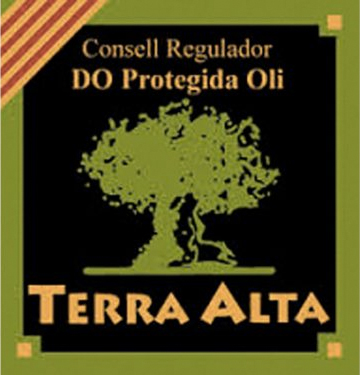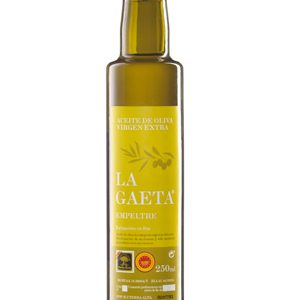1) If you want to buy the best oil, you definitely have to opt for extra virgin olive oil (EVOO)
No matter what you’re going to use it for: frying, cooking, seasoning sauces, salads, or desserts… using extra virgin olive oil for cooking is not a waste, but rather a contribution of flavor and quality, as it contains a higher concentration of polyphenols and natural antioxidants beneficial to health.
Plus, you’ll be using a natural product rather than one chemically processed. From a culinary point of view, the better the ingredients, the more natural and higher quality, the better the result of your dishes.
2) Better with protected designation of origin
The seal of a protected designation of origin (PDO) on the packaging of an olive oil is the greatest guarantee of quality, a European distinction that certifies that this oil has undergone strict controls. La Gaeta extra virgin olive oils carry the DOP Terra Alta Olive Oil seal (a designation of origin from southern Catalonia characterized by oils with aromatic nuances reminiscent of almond and green walnut).
We harvest the best arbequina and empeltre olives from our estates located in Vilalba dels Arcs (Terra Alta) through mechanical procedures to offer you monovarietal extra virgin olive oils with a characteristic gourmet touch.
3) Color has NOTHING to do with oil quality
Even though dark green is in fashion, the color of the oil does not indicate whether it is of better or worse quality. The color of the oil is determined by the time the olive is harvested and its variety. Thus, an olive of the same variety harvested at the same time of the campaign can result in good or bad oil depending on how the rest of the process is carried out. Notice that professional tasters use blue tasting glasses, which hide the color of the oil so that it does not influence their evaluation.
4) Watch out for the acidity of olive oil
Many consumers buy an oil looking at the acidity level without knowing that it does not directly relate to taste, but indicates the amount of free fatty acids it contains. But it is true that low acidity is a positive indicator of oil quality. An extra virgin olive oil has less acidity than a virgin olive oil, which means that the lower its acidity, the less the olive oil has been affected and the better its qualities will be. In this sense, the law stipulates that EVOO should never exceed one degree of acidity (1%).
What really influences the taste perception of olive oil is its polyphenol content (natural antioxidants). Oils with a high polyphenol content often have a more intense presence of bitter and pungent attributes in their taste, unlike other olive oils that are sweeter and lighter like those of the arbequina variety. But as you know, when it comes to tastes, there are flavors.
In short, if you want to buy a good oil, with character and personality, forget about the price as the first criterion before buying, opt for an extra virgin olive oil with a protected designation of origin.




